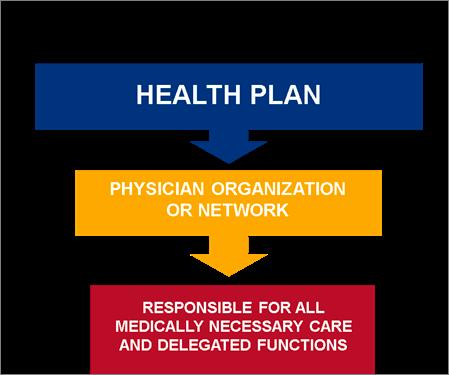
8 minute read
The Journal of America's Physician Groups Summer 2020 Edition
BY UTE BURNESS, RN
Advertisement
The historical growth of HMO products has resulted in the growth and expansion of delegation—not only of financial risk, but also of administrative responsibilities. In order to manage financial risk while providing highquality patient care, physician organizations developed the systems, “ The major tools, and resources needed to successfully perform these additional reason to accept administrative functions and care management delegation is activities. to increase the The growth of this delegated model is organization’s often attributed with the success of capitated, control over or value-based, care. In recent years, a number decisionof organizations, including the Integrated making.” Healthcare Association (IHA) in California, have provided supporting evidence that HMOs and delegated physician organizations demonstrate better quality and lower costs.
As illustrated in IHA’s July 2016 Regional Health Care Cost & Quality Atlas Fact Sheet, HMOs consistently outperform commercial PPOs on both clinical quality and cost measures. In addition, Medicare Advantage (MA) plans typically outperform Medicare fee-for-service on both clinical quality and cost measures.
PHYSICIAN ORGANIZATIONS AND DELEGATION
the care of its patients. The model has become common in many states, with provider organizations delegated for everything from a few to several administrative services.
As more health plans delegate to provider organizations, it promotes the ability of providers to achieve the quadruple aim: improving the health of populations, enhancing the patient experience of care, reducing the per-capita cost of health, and improving the lives of healthcare providers. Assuming delegation for administrative services, along with financial risk, is fundamental to being able to control the total dollars—while managing and delivering care to patients.
WHAT IS DELEGATION?
The National Committee for Quality Assurance (NCQA) defines delegation as a formal process by which an organization gives another entity the authority to perform certain functions on its behalf. Although an organization may delegate the authority to perform a function, it may not delegate the responsibility for ensuring that the function is performed appropriately.
Health plans hold the license or certificate to function as health plans in the state in which they provide services. Therefore, the plans retain the ultimate responsibility and accountability for ensuring delegated functions are performed appropriately.
However, delegation has many advantages for both the health plan and the provider organization. This is why so many plans delegate as many administrative functions as possible to contracted provider organizations. The terms and mutual responsibilities are typically detailed in an agreement between the plan and the provider organization.
QUESTIONS TO ASK
For provider organizations, the value of becoming a delegated entity is in the increased control in key functional areas, including medical decision-making, dollars and claims payment, and provider network decisions.
The key is to understand the requirements related to delegation and assess internal capacity to successfully provide these services. Some organizations take as many of the administrative functions as possible from the health plan to
create a competitive edge, while enhancing their level of control. However, there are a few questions to ask before accepting delegation, including:

Is your organization financially ready to become a delegated entity or to expand delegated functions? Does your organization have the expertise to provide such services and to ensure compliance for delegated functions?
Does your organization have the necessary information systems, data collection, and analysis capabilities to monitor and report delegated functions? Does your organization have established internal audit and oversight capabilities? Has your organization conducted a value-based risk analysis to determine the pros and cons of accepting delegation?
IMPACT OF DELEGATION
Once your organization has agreed to accept delegation and a detailed delegation agreement has been negotiated, it is important to understand the role and impact of delegation throughout the organization. Here are some areas to consider.
GOVERNANCE STRUCTURE
The provider organization needs to have a board of directors that wants to take on the roles that come with delegation. Leadership needs to support the cost and infrastructure it will take to perform the administrative services the organization is contracted to provide.
The board and leadership team need to be committed to improving their knowledge and understanding of managed care principles and compliance requirements through continuing education and training, continuous quality improvement, and introduction and adoption of best practices. This will enable the organization to successfully operate in an efficient and cost-effective manner and in full compliance with all rules, regulations, and guidelines.
FINANCIAL CONSIDERATIONS
Taking on delegated administrative services enhances the financial risk of the organization. The organization’s financial viability in a delegated model is a critical factor in the decision to accept delegation. Additionally, the organization must be prepared to monitor and reconcile membership and payments received from the health plan to ensure accurate accounting of dollars paid.
CLAIMS MANAGEMENT
A provider organization must be able to process all types of claims for which it has financial risk. It will need to be prepared to support the necessary infrastructure—including policies and procedures, competent claims staff, configuration, provider dispute resolution processes, and recovery, as well as a claims payment system that is sufficiently expansive to accommodate all types of claims and data retrieval.
CREDENTIALING
The organization must have and maintain the ability to credential and recredential all types of providers, including physicians, nonphysicians, ancillary providers, and facilities. Further, it must monitor and continuously update its provider network and have processes in place to monitor, track, and report sanctioned and excluded providers.
MEDICAL MANAGEMENT
Medical management is a broad term that may include utilization management and medical decision-making related to pre-service requests, concurrent review, and post-service requests. The term may also include case management, care coordination, and population health management.
All of these require expert clinical staff who can administer the authorization processes, as well as other programs designed to manage risk and coordinate care and services. Some or all parts of medical management may be delegated. The detailed delegation agreement is vital to ensuring a complete understanding of what is delegated and what is not.
DATA ANALYTICS
Data is critical to the success of managing a risk population. Most delegation agreements have specific reporting requirements, so it is important to evaluate your data collection and reporting capabilities. It is also essential that the organization monitor performance and compliance with contractual obligations.
Detailed member information is essential for population health management, for proactively managing care and services, and for better identifying and managing risk. Basic data collection and analysis requirements include:
An organized system to collect and report uniform data.
This can be as simple as an Excel spreadsheet or as sophisticated as a registry. continued on page 38
Choosing an MSO...continued from page 37
To do otherwise may place the medical group or IPA and the MSO in conflict with regulatory bodies. For example, the Medical Board of California has determined that certain decisions remain in the realm of physician expertise, and these decisions and activities can be made by a physician who consults with the MSO, but not by the MSO alone. 1
10. OVERSIGHT AND MONITORING
The MSO, under the ASA, is accountable to the purchaser. It is the purchaser that holds the contracts with health plan partners, so it is the entity held accountable for ensuring full regulatory compliance. Therefore, the purchaser must be prepared to conduct oversight of all delegated functions.
This is not as simple as it may sound. Oversight is a two-way street that requires open, transparent communication and cooperation between the two parties. Along with expertise and capacity, the MSO should promote your ability to readily oversee its activities. This is a key factor in the selection process. The MSO must be capable and committed to providing transparent communications regarding performance and accuracy of reports to ensure compliance on behalf of your medical group or IPA.
All too often, we see purchasers who abdicate to the MSO— and MSOs that attempt to unduly control the business in favor Accepting Delegation...continued from page 33 given subset of the membership CONTRACTING The provider organization is responsible for ensuring its provider network addresses all services identified in the risk agreement. Contracts with your providers must address all compliance requirements, as well as any specific requirements associated with delegation. A critical success factor is to fully understand the contract with the health plan, along with any additional delegation documents. COMPLIANCE Accepting delegation means that the organization has agreed to meet all applicable regulations that govern the products related to the delegated services—as well as all associated contractual obligations. It is essential that the organization is committed at all levels to ensuring compliance with all services. of the MSO and not the purchaser. Clear and transparent communications—along with frequent and thorough oversight of the MSO through ongoing monitoring, auditing, and compliance reviews—are essential to ensuring that the terms and intent of the ASA, as well as regulatory compliance, are met.
CONCLUSION
The decision to contract administrative services to an MSO or to change from one MSO to another is a major one that requires time and due diligence efforts. Selecting an MSO requires many considerations. It is essential the purchaser not short-cut the process. To do so could easily result in an adverse or costly outcome.
Asking all the right questions and conducting an exploratory due diligence assessment will yield a best-fit relationship that is supported by mutual goals, clear expectations, cost-effective processes, and mutual benefit—without the MSO exercising undo control. o Russell Foster and Sheila Stephens are Senior Advisors for Mazars USA LLP. They can be reached at Russ.Foster@ MazarsUSA.com and Sheila.Stephens@MazarsUSA.com.
Endnotes
1 Medical Board of California’s Corporate Practice of Medicine guide; http://www.
The ability to evaluate specified outcomes related to a Knowing how the data relates to the business strategy
mbc.ca.gov/Licensees/Corporate_Practice.aspx Compliance considerations include state and federal regulations; HIPAA; fraud, waste, and abuse; and training and education, along with associated documentation. Accepting delegation is a major commitment. It’s critical to have an internal team that understands the regulations and obligations.
WHY AGREE TO DELEGATION?
The major reason to accept delegation is to increase the organization’s control over decision-making. Taking only financial risk allows a provider organization to contract competitively, as well as possibly expand revenue from payers, but it does not provide the structure needed to manage its dollars or its membership.
Delegation of administrative services provides the basis for decision-making, fiscal management, and network management. It’s that basis that encourages the provider organization to be creative and innovative in how it manages its patient population—and how its network providers are paid. o Ute Burness, RN, is Director of Mazars USA Healthcare Consulting Practice. She can be reached at ute.burness@ mazarsusa.com.


